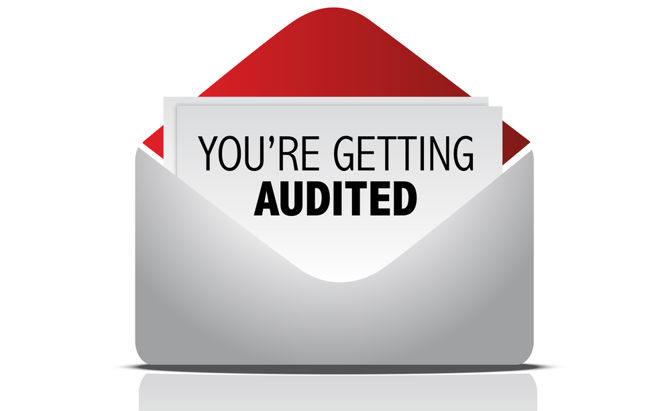Being Audited by the IRS
by Bob Williams

You got this—all you have to do is start!
We make filing taxes delightfully simple with one, flat–rate price. Every feature included for everyone.
Start filing
You’ll get the news in a plain-looking envelope; your only clue – the IRS logo in the return address. You swallow to get that lump in your throat back where it belongs. You rip open the envelope to find … it’s an AUDIT!
That’s right, you lucky taxpayer, you get to justify your income tax choices to the nice Men in Black. You quickly conjure of visions of being ostracized by your neighbors as the agents drag you screaming to the debtor’s prison and your children move away because they don’t want to be associated with a tax cheat.
Whoa there, partner. Take a few deep breaths. Calm down.
Rule One of the IRS Audit Instructions: Don’t Panic. (If it’s not, it ought to be.) Chances are, your return wasn’t even picked because of something you actually put in it.
A Little Perspective
First of all, the IRS selects over a million returns for audit every year, so you’re far from alone. Many of these are chosen at random as a quality control action. Others, though, might be chosen because they fit known patterns of fraudulent behavior, or actually contain some sort of error.
Luckily, a lot of audits – no matter why they’re singled out – result in a refund or acceptance of the return as originally filed.
In many cases, you’ll just have to pay a small additional tax assessment – if anything at all. But should you have a more serious situation – or you don’t agree with the IRS findings – you still have several options.
Know Your Rights
One option is to consult Publication 1, “Your Rights as a Taxpayer” . In it, you will find a declaration of taxpayer rights, as well as helpful information such as how to contact the Taxpayer Advocate Service (TAS). The TAS is an independent organization within the IRS and helps taxpayers resolve problems with the IRS and recommend changes that will prevent the problems.
You can also find helpful information in Publication 5, “Your Appeal Rights and How To Prepare a Protest If You Don’t Agree”, and Publication 910, “IRS Guide to Free Tax Services”.
One note of caution: While you very well may desire to represent yourself before the IRS audit, a “do-it-yourself” approach isn’t always the best tactic. When it comes to an audit, your representative generally must be an attorney, Certified Public Accountant (CPA), or Enrolled Agent (EA). These professionals are permitted to practice before the IRS.
While attorneys and CPAs are known terms, the Enrolled Agent designation is not as well-known. For the most part, EAs are tax professionals or former employees of the IRS. Those EAs who didn’t come from the IRS must go through a rigorous testing process in order to receive their EA certification. The EA certification gives them unlimited rights to practice before the IRS.
The Cost of Audit
Keep in mind that if you cannot afford an attorney for an audit, you will not be provided one free of charge (as you would in a court of law). Expect to pay a fair price for representation. Depending on the circumstances, the stakes may be high, so choose well and get the best representation you can afford. As you look around, you’ll likely find that an EA can provide the most expertise with your particular issue for the lowest cost.
What happens if you cannot get your issue resolved after the IRS appearance? Then the case goes to tax court – and you will need an attorney to represent you there. Hopefully your case will be resolved long before it gets that far.
For a good overview of the audit system, as well as the appeal process, check out the IRS Publication 556, Examination of Returns, Appeal Rights, and Claims for Refund for more information.
Sign up for more of this.
Subscribe to our blog for year–round finance strategies and tax tips. We’re here to remove the dread from filing taxes.









